Be Aware
Phishing e-mails and text messages may look like they’re from a company you know or trust: a bank, a credit card company, a social networking site, an online payment website or app, or an online store. Phishing e-mails and text messages often tell a story to trick you into clicking on a link or opening an attachment. These days it is hard to avoid getting phishing e-mails. However, you can avoid becoming a victim!
Do not respond to these e-mails, and never provide any personal information by e-mail. Do not click any links and do not open any attachments you weren’t expecting to receive. Do not forward these e-mails to your friends.
Take a closer look at the screen shots of these most recent emails:
Phishing emails want you make a payment and often offer a coupon OR a free stuff. This is to trick you into giving them your personal information.
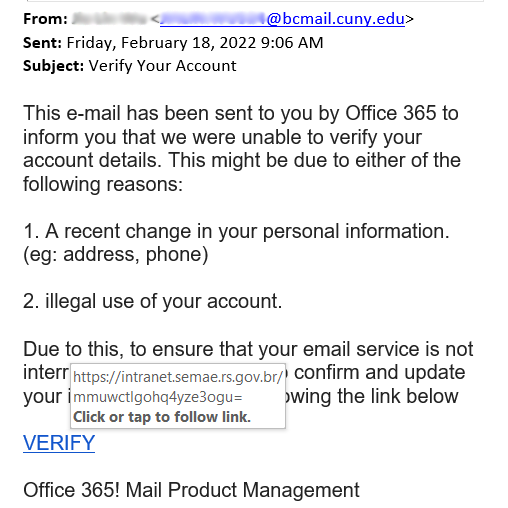
1. Mouse over the VERIFY link, will reveal non-Brooklyn College/CUNY address.
2. Official Brooklyn College/CUNY email correspondence will always have official Brooklyn College contact information listed.
3. NO official correspondence originates from student email account (@bcmail.cuny.edu).
Do not respond to this email, do not click on any links. This email should be deleted.
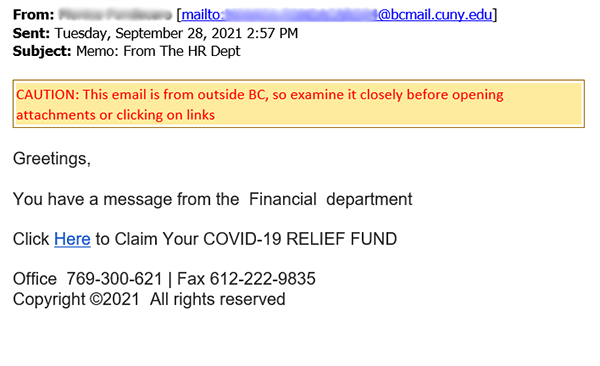
1. As our system clearly indicates, this email came from outside of Brooklyn College it DID NOT come from within the college.
2. Official Brooklyn College email correspondence will always have official Brooklyn College contact information listed.
Do do not respond to this email, do not call any numbers listed. This email should be deleted.
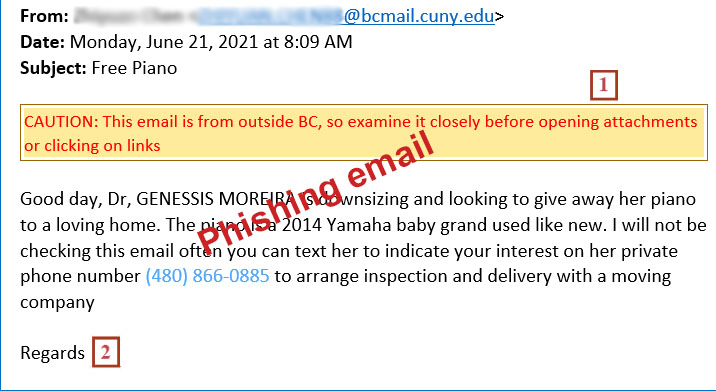
1. As our system clearly indicates, this email came from outside of Brooklyn College it DID NOT come from within the college.
2. Legitimate signature is missing.
Do not respond to this email, do not call any numbers listed. This email should be deleted.
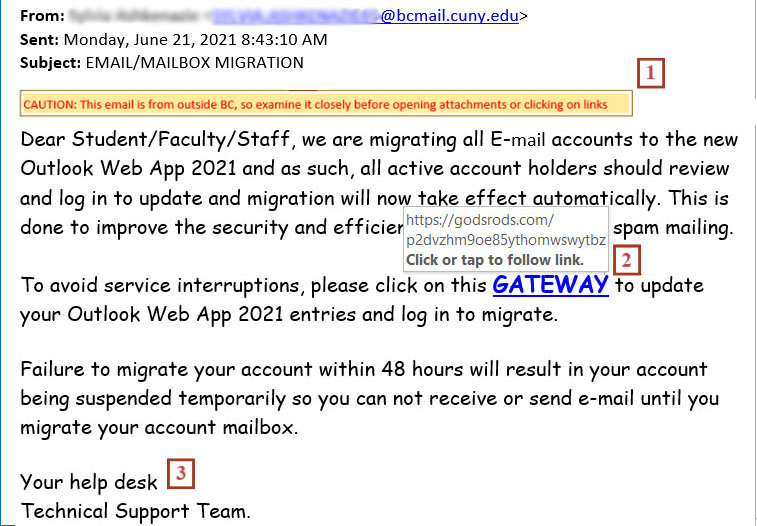
1. As our system clearly indicates, this email came from outside of Brooklyn College it DID NOT come from within the college.
2. Mouse over the GATEWAY link, will reveal non-Brooklyn College address.
3. Official Brooklyn College email correspondence will always have official Brooklyn College contact information listed.
Do not click any links and do not respond to this email. This email should be deleted.
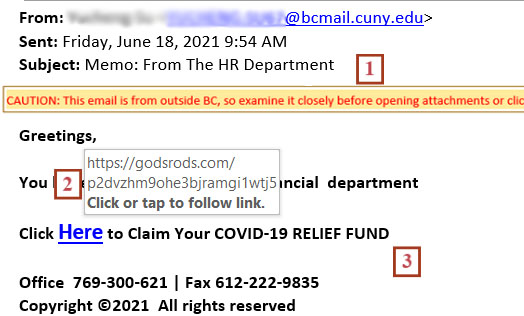
1. As our system clearly indicates, this email came from outside of Brooklyn College it DID NOT come from within the college.
2. Despite the fact this email came from Brooklyn College, mouse over the link, will reveal non-Brooklyn College address.
3. Official Brooklyn College email correspondence will always have official Brooklyn College contact information listed.
Do not click any links and do not respond to this email.
This email should be deleted.
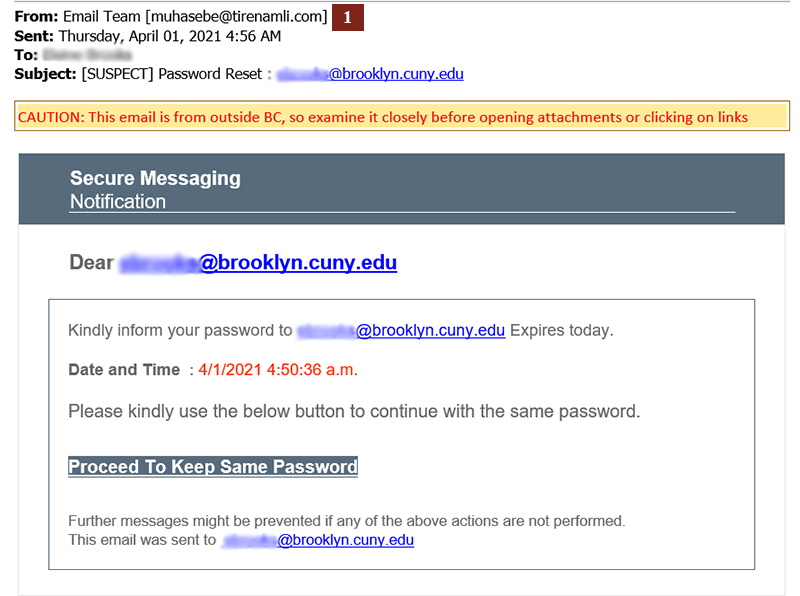
1. As our system clearly indicates, this email came from outside of Brooklyn College it DID NOT come from within the college.

Do not click any links and do not respond to this email.
Conclusion: This email should be deleted.
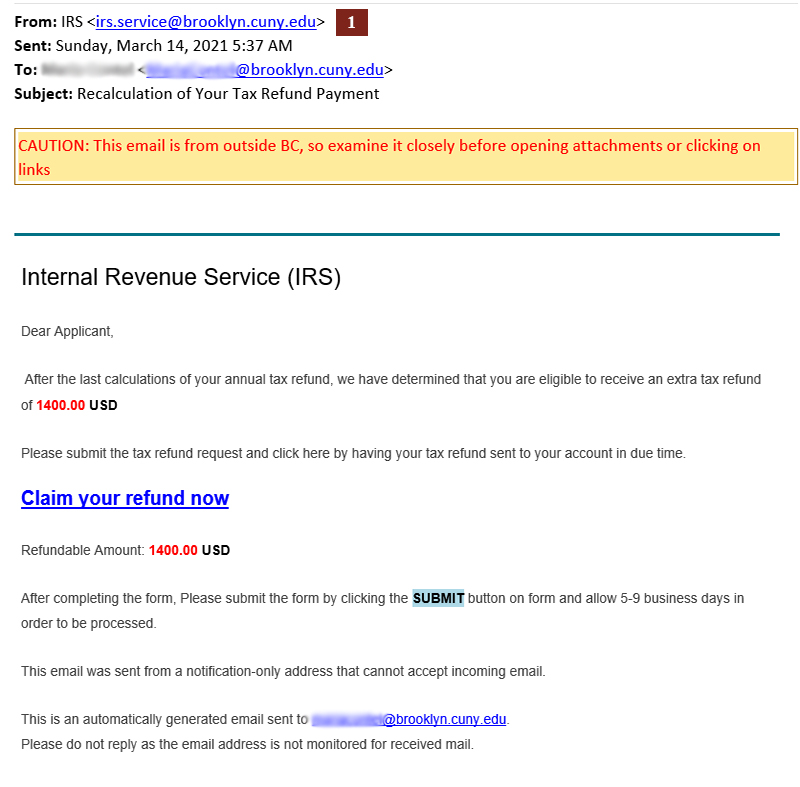
1. Despite the email showing sender as someone from Brooklyn college (irs.service@brookyn.cuny.edu) our system clearly indicates it DID NOT come from within the college.

Do not click any links and do not respond to this email.
Conclusion: This email should be deleted.
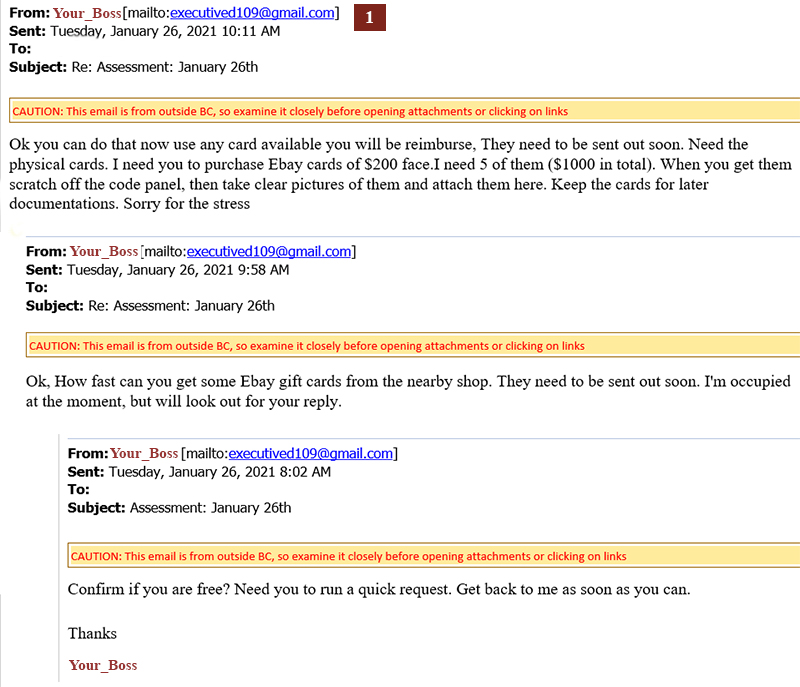
-
Our system clearly indicates it DID NOT come from within the college.

Scammers will often send the email from a random email account and change the Display Name of the email address to either your boss, supervisor, or director.
Conclusion: This email should be reported to bc-InfoSec@brooklyn.cuny.edu and deleted.
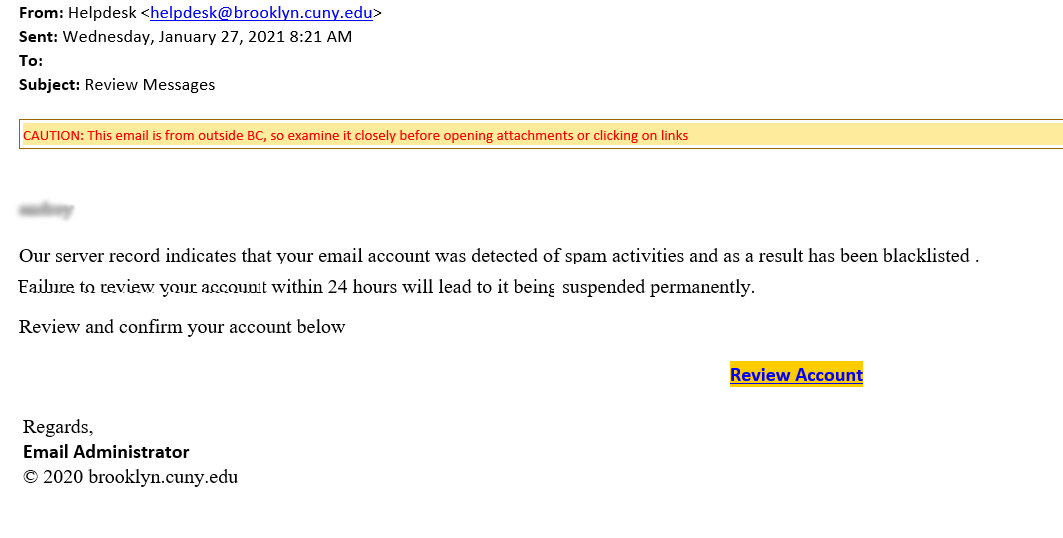
Despite the email showing sender as someone from Brooklyn college (helpdesk@brookyn.cuny.edu) our system clearly indicates it DID NOT come from within the college.

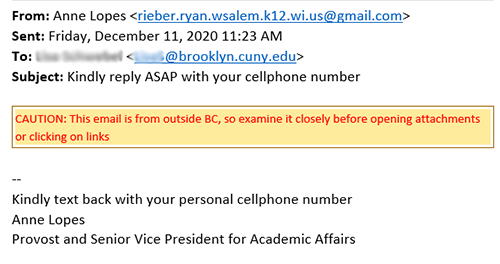
-
Our system clearly indicates it DID NOT come from within the college.

-
The name of the sender does not match sender's email address.
Do not respond to this email.
Conclusion: This email should be deleted.
The U.S. Department of Health and Human Services Office of Inspector General is alerting the public about fraud schemes related to the novel coronavirus (COVID-19). Scammers are using telemarketing calls, text messages, social media platforms, and door-to-door visits to perpetrate COVID-19-related scams. Fraudsters are offering COVID-19 tests, HHS grants, and Medicare prescription cards in exchange for personal details, including Medicare information. However, these services are unapproved and illegitimate. https://oig.hhs.gov/coronavirus/fraud-alert-covid19.asp
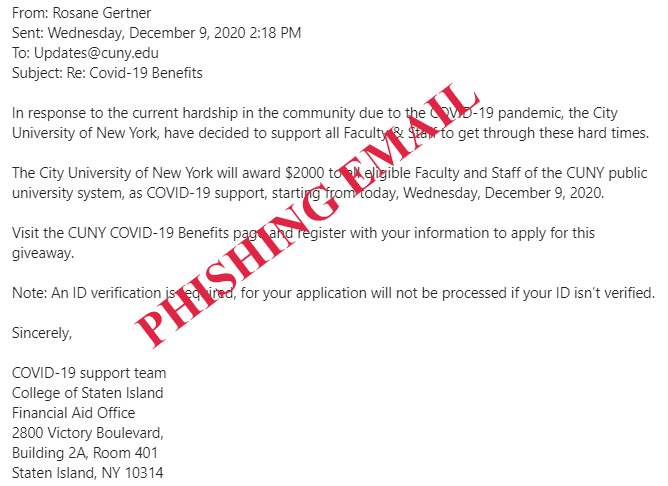
Conclusion: This email should be deleted.
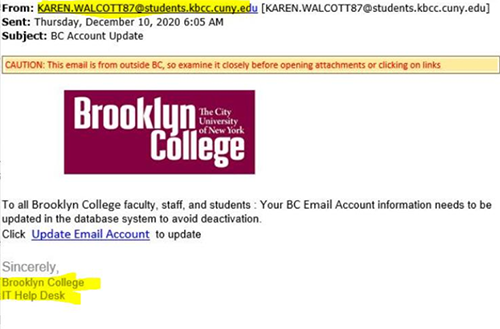
The FROM field states this email came from kbcc.cuny.edu (Kingsborough Community College) BUT the footer says it came from Brooklyn College ITS Help Desk.
Conclusion: This email should be deleted.
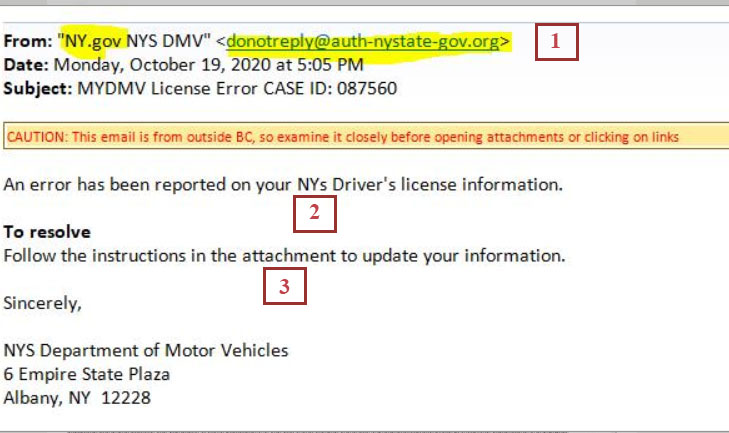
-
The domain of the sender does not match.
-
The spelling of NYS is wrong (there shouldn't be a lowercase s in NYs). Possibly the easiest way to recognize any fraudulent email is bad grammar.
-
Unsolicited emails that contain attachments reek of hackers. Typically, authentic institutions don’t randomly send you emails with attachments, but instead direct you to download documents or files on their own website.
Conclusion: This email should be deleted.
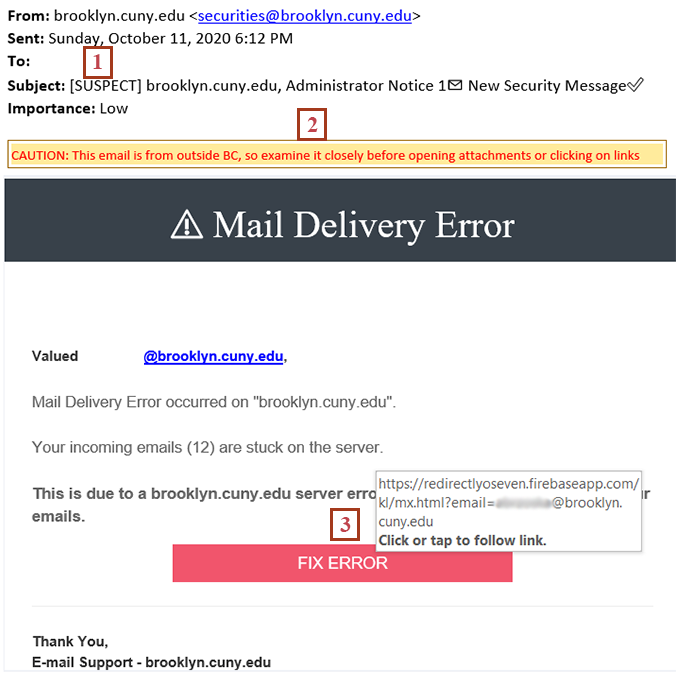
- Our email security system that filters all inbound and outbound email traffic flagged this email as suspicious by inserting [Suspect] in the Subject line of this email.
- Despite the email showing sender as someone from Brooklyn college (securities@brookyn.cuny.edu) our system clearly indicates it DID NOT come from within the college.

- Mouse over the FIX ERROR button, will reveal non Brooklyn college address.
Conclusion: This email should be reported to bc-InfoSec@brooklyn.cuny.edu and deleted.
Below is another example of a fraudulent email:

Despite the email showing sender as someone from Brooklyn college (webmaster@brookyn.cuny.edu) our system clearly indicates it DID NOT come from within the college.

Conclusion: This email should be reported to bc-InfoSec@brooklyn.cuny.edu and deleted.






